Wagner: Der Fliegende Holländer (Haenchen)
Introduction
Wagner's tale of the damned ghostly ship's captain in search of redemption and a final passage home has been given the 'updated' treatment by Martin Kuej, and up to point (actually up to the final moment of the opera itself) is surprisingly successful.
I'm not sure we are anywhere near the Norway Wagner imagined when the storm hits at the start, despite Daland saying he recognises the bay in which his ship has floundered. Well, when I say 'ship', it's more of a small cruise liner, or at least a private yacht that appears to have been hit by a Mediterranean / tropical storm a long way off from where the original story takes place. Daland himself is more of a dapper, well-dressed cruise-captain, and his crew are the sort of fun-loving partying types who you would normally cross the street to avoid (and there is a surprising amount of women on board as well!)
When the Dutchman's ship finally appears, the ghostly figures of what turn out to be the 'lost souls' of those seeking asylum gather outside the glass doors of the world from which they have been barred. The Dutchman is therefore transformed into a human trafficker whose legendary riches are made up of the money people pay in an attempt to take themselves to a better life and a new home…much like the Dutchman's original story.
The Dutchman and his 'crew' are suddenly very human, and this is shown quite graphically when three of them appear behind the dividing doors during Senta's aria in Act II, covered in blood, dying almost immediately. Erik, the hunter, and Senta's intended, has taken on the persona of an anti-immigration lunatic of the type with which we are now all-too-familiar.
The 'Spinning Chorus' that begins Act II, and which precedes the beginning of the killing, shows the women of the village (or wherever they are) dolling themselves up to make themselves as pretty as possible for the return of Daland's men (the women 'passengers' have mysteriously disappeared). Senta is the only one actually spinning, leaving at least one of the orginal Wagnerian concepts intact. The other girls taunt and tease her about her seemingly crazy ideas about finding her imaginary 'Dutchman' for whom she has longed almost all her life.
When Daland appears with the eponymous character himself, we are finally thrown back into the Wagnerian psychological maesltrom of two people meeting for the first time, yet who have dreamt about each other for years. Kuej's direction for this scene is at its most potent, and the most powerful in the production.
Act III sees the 'Norwegian' crew and their girls enjoying a disco before they all leave port again, except this time they are themselves behind the screen with the 'Dutchmen' at front of stage, representing the real world of pain, loneliness and not-belonging (well, this is my take on it anyway). The Western ideals of partying and general hedonism are remote and trivial to those who have nothing.
The final scene presents the Dutchman and Senta having to make their minds up. Senta has yearned for this moment, as it will take her away from the bourgeois, petty lifestyle to which she is destined, yet the Dutchman has decided that she cannot be part of his operation, as he sees her proposed attachment to Erik as a deception.
As in Wagner's original perception, both the Dutchman and Senta find their own redemption in death, although probably not in the way it's dealt with here, in that Erik shoots them both. Oh well, at least we get through a very commendable version before this point.
Sound and Vision
Very impressive. There are only one or two moments where the balance favours the pit, most notably at the end of Act II when the two male leads are hard to hear, but overall it's a great recording.
Visually, the production is stark in its treatment of light and dark, and this is carried across quite dramatically for the DVD. The advantage of adding super-imposed video elements is used to great effect for the overture, and there are some very close close-ups of the orchestra which hopefully didn't get in the way of things.
Extras
A c.22 minute 'Inisights and Interviews' item, which is quite watchable and in which even Robert Lloyd, who is one of the most experienced Wagner singers around, admits that the production will be found "very challenging" by traditional Wagnerians.
Conclusion
The most successful, and attractive aspect of this production is the musical direction of Hartmut Haenchen.
The overture is as exciting as you would want, and despite certain sections being perhaps more leisurely than I would have hoped (I'm probably spoilt by many concert performances of course), Haenchen's pacing of the whole work is exemplary and the stamina of the Netherlands Phil., let alone their playing, is astounding. There's a slightly wobbly quiet low trumpet in one moment, but I can forgive that.
On stage, we are very lucky indeed to have an ensemble without a weak link in sight. You may prefer a different type of voice for different roles, such as perhaps that of Mary (Marina Prudenskaja), who is less like Senta's nurse and more like a rival, with a young, powerful voice to match. I quite enjoyed the change.
Oliver Ringelhahn's carries off the Steersman's frighteningly difficult early song with far more confidence than many, yet his character is spoiled somewhat by the directorial instruction to steal a shiny gold jacket off a ship's entertainer before beginning.
Erik, as I have mentioned, does not invoke a lot of sympathy in this production, yet Marco Jentzsch's voice transcends the inherent evil implied in his characterisation on stage, and so if you weren't watching you would feel this is one of the best you have heard in the role.
Robert Lloyd was supposed to have given up this sort of thing a good few years before this was recorded (according to himself), but you can't help feeling his decision to return to roles such as Daland was a wise one. Weeks short of his 70th birthday, his voice still has the power to grab your attention, and it's always good to see him in his element.
The partnership of Catherine Negelstad as Senta and Juha Uusitalo as the Dutchman is inspired. Negelstad's voice is perhaps more familiar singing earlier music, yet here, the purity of her tone shines through, and she rarely has problems in projecting over the huge orchestral forces. Juha Uusitalo's Dutchman simmers menacingly under his large frame, and has a voice quite capable of shaking the room where necessary. There are moments earlier on when some of his top notes are a little shaky, and his delivery sometimes means the notes are sacrificed for a more declamatory tone, but there's no denying he's one of the more successful Dutchmen in recent years.
When the two are on stage together, there's no contact between them but everything that is unsaid can be seen in their eyes and body language, the subtlety of which could have been lost in a large auditorium.
So, apart from the very annoying ending, this is actually a new production that is able to make valid comments about ideas and ideals that resonate in today's society, and is well-worth watching.
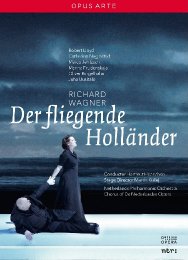

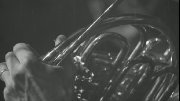
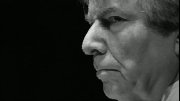

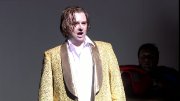

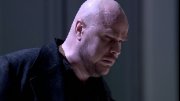
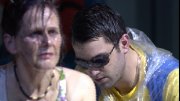
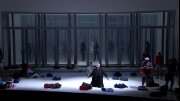
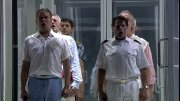
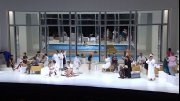
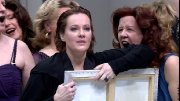
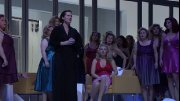



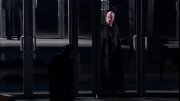
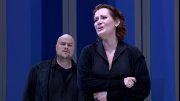
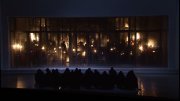
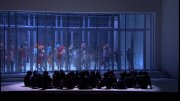
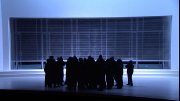
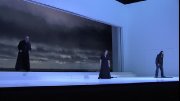
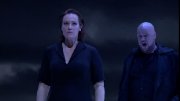

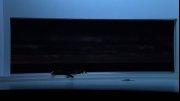








































Your Opinions and Comments
Be the first to post a comment!